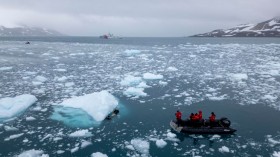Pre-hatching environment influences lateralization in cuttlefish, finds a new study.
Lateralization is the idea where the left and right side of the brain perform various functions. Cuttlefish always turn left when they detect a predator by smelling its scent, showing signs of lateralization.
It was not known what influenced the development of lateralization in these organisms. But a new study by researchers from Université de Caen Basse-Normandie in France has found that it is not just genetics, but the pre-hatching environment also plays a significant role in setting-up of lateralization, reports LiveScience.
The research team placed 193 cuttlefish eggs in three different conditions. The eggs were placed in water where they were exposed to predators like sea bass, in water filled with harmless sea urchins and in clean water with no presence of other marine organisms.
After the eggs were hatched, the offspring were put in a T-shaped tank in three different conditions again. Those baby cuttlefish that were exposed to predator-scented water before hatching, turned left more often, irrespective of the conditions in the T-shaped water tank.
Baby cuttlefish in sea bass-scented water turned left more often than turning toward the right side, no matter in which condition the eggs were incubated and hatched. Experts performed over 10 trials and found that the offspring turned left whenever they encountered danger from predators.
"This is the first evidence that predation pressure can directly influence the setting-up of lateralization," study researcher Christelle Jozet-Alves told LiveScience.
This suggests that genetics alone does not influence lateralization, but the pre-hatching environment also plays a significant role in its development.
The findings of the study are published in the journal Proceedings of the Royal Society B.
© 2024 NatureWorldNews.com All rights reserved. Do not reproduce without permission.



![Extreme Heat Wave in Africa’s Sahel Region That Killed 100 People Linked to Climate Change [Study]](https://1471793142.rsc.cdn77.org/data/thumbs/full/70226/280/157/50/40/extreme-heat-wave-in-africa-s-sahel-region-that-killed-100-people-linked-to-climate-change-study.jpg)

